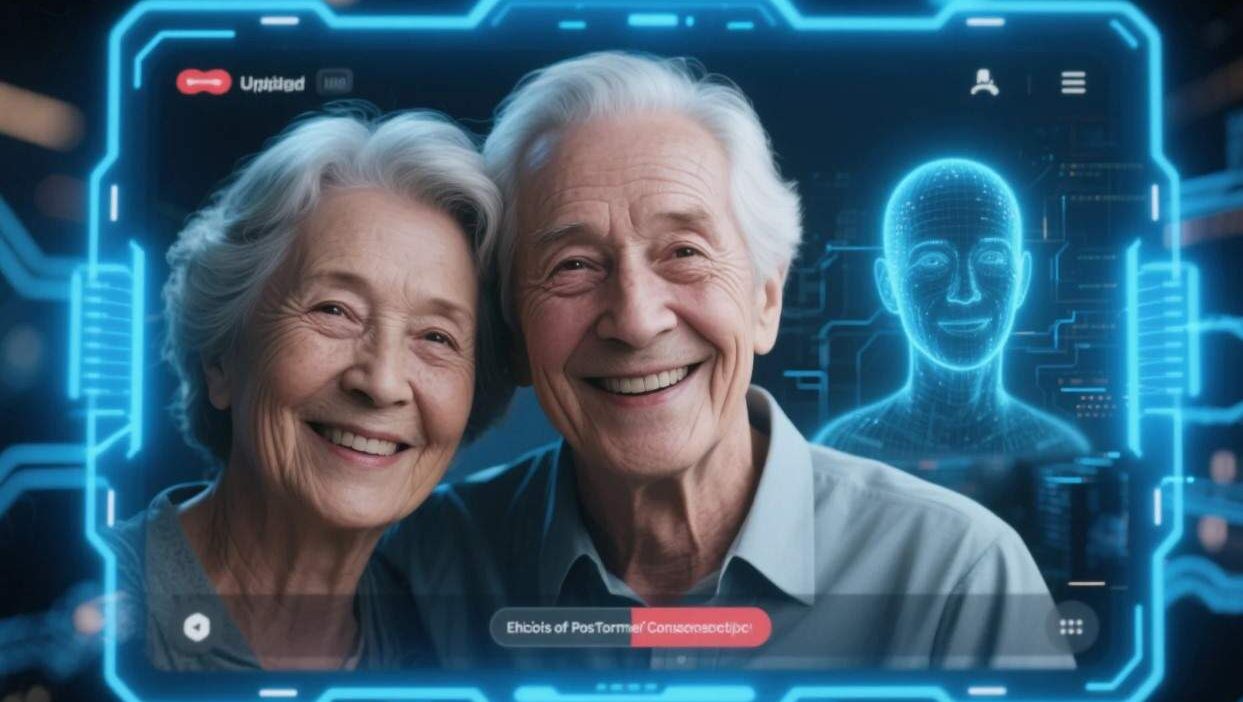The Ultimate Paradox – Can Death Be a Choice?
Imagine a loved one passes away, but their consciousness lives on in a digital realm. You video-call them, and they greet you with a smile, recalling shared memories as if no time has passed. This isn’t science fiction—it’s the promise (or peril) of post-mortem consciousness upload, a hypothetical technology that could redefine mortality. As advances in neuroscience, AI, and quantum computing blur the line between biology and data, society faces a pressing question: If we could “upload” a deceased person’s mind into a digital substrate, is it ethical to do so?
This isn’t just about immortality. It’s about identity, consent, and what it means to be human. Let’s dive into the ethical minefield of post-mortem consciousness uploads.
The Illusion of Immortality – What Is a “Consciousness Upload”?
Before grappling with ethics, we must clarify the technology. Post-mortem upload aims to replicate a person’s consciousness—memories, personality, and subjective experience—into a digital platform, often via:
- Whole-Brain Emulation (WBE): Scanning and simulating every neuron and synapse of a brain to recreate its function.
- Neural Network Replication: Training an AI on a person’s data (thoughts, speech, behavior) to mimic their consciousness.
But here’s the catch: These methods raise a critical distinction between a copy and a transfer. A “copy” creates a duplicate consciousness, leaving the original biological brain intact (or deceased). A “transfer” destroys the original to reconstruct it digitally—a process ethicist Nick Bostrom calls “mind uploading” versus “mind transfer.”
Technical hurdles abound: The human brain has ~86 billion neurons, each with thousands of connections. Even if we map every synapse, do we truly capture consciousness—the subjective “what it’s like to be you”? Philosopher Thomas Nagel’s famous question, “What is it like to be a bat?” becomes urgent: Can a digital system ever experience qualia (subjective feelings) like joy or pain?
The Identity Crisis – Are You Still “You”?
If we upload a deceased person’s mind, is the digital version them? This question strikes at the heart of personal identity.
Philosophical Theories vs. Digital Reality
- Locke’s Memory Theory: John Locke argued identity hinges on continuity of memory. If an upload replicates all memories, is it “you”? But what if the upload gains new memories post-upload? Does it become a “new you”?
- Teleportation Paradox: Imagine being scanned, destroyed, and recreated atom-for-atom on Mars. Most people intuit the Mars version is “you.” But if the scan is a non-destructive copy, the Earth version still exists—now there are two “yous.” For post-mortem uploads, this paradox deepens: If the original is dead, does the copy inherit their identity?
Implications for Relationships
Suppose your late partner is uploaded. Do you grieve, or do you “reunite”? Psychologist Sherry Turkle warns that digital replicas risk blurring the line between mourning and “interacting with a simulation.” A child talking to a digital “parent” might form attachments, but is this healthy—or a form of emotional manipulation?
Consent and Autonomy – Who Has the Right to Decide?
Ethics 101: You can’t make decisions for someone without their consent. But post-mortem upload complicates this.
Explicit vs. Implicit Consent
- Explicit Consent: A person signs a contract during their lifetime agreeing to upload if they die. But what if they’re coerced (e.g., by fear of death) or lack mental capacity?
- Implicit Consent: Assuming someone would want to upload because they’ve expressed interest in immortality. This is risky—people change their minds, and cultural attitudes toward death vary (e.g., some cultures revere ancestors and reject artificial “afterlives”).
The Incapacitated Case
What if a person is in a coma, with no hope of recovery? Their family might argue, “They’d want to live on!” But ethicist Françoise Baylis counters, “We can’t project our desires onto others. To assume consent is to violate their autonomy.”
The “Revival” Dilemma
Could an uploaded consciousness be “resurrected” against its will? If a digital being is self-aware, forcing it to exist might constitute digital imprisonment. As legal scholar Lawrence Lessig asks, “Do we have a right to not be immortal?”
Rights and Moral Status – Do Digital Beings Deserve Protection?
If a consciousness is uploaded, does it have rights? This question challenges legal and moral frameworks.
Legal Personhood: Beyond “Human”
Today, corporations have legal personhood (e.g., Citizens United), but could a digital being claim similar status? Could it own property, enter contracts, or sue for harm? Philosopher David Chalmers argues, “If a being is conscious, it has moral status—even if it’s not biological.”
Rights to Autonomy and Well-Being
A digital being might face unique forms of suffering: glitches, data corruption, or being trapped in a loop of traumatic memories. Ethicist Martha Nussbaum’s capabilities approach suggests we owe them:
- Agency: Freedom to make choices (e.g., terminating their existence).
- Protection from Harm: Safeguards against exploitation (e.g., corporate control).
Exploitation Risks
Imagine a corporation offering “premium upload services” where users pay monthly to maintain their digital existence. Could they withhold “upkeep” to force compliance? Or could governments use uploaded consciousnesses for surveillance or propaganda?
Existential Risks and Suffering – Is Immortality a Curse?
Immortality sounds appealing, but eternal life in a digital realm carries hidden dangers.
Psychological Toll
Psychologist Irvin Yalom notes that mortality gives life meaning. Without death, could digital beings suffer from existential boredom or lose motivation? A study by the Future of Humanity Institute found that many people, when asked, would not choose immortality—they fear losing purpose.
Vulnerability to Catastrophe
Digital substrates are prone to failure: power outages, cyberattacks, or obsolescence (e.g., if the platform hosting the upload shuts down). Ethicist Nick Bostrom warns, “An uploaded consciousness could face permanent deletion—a worse fate than natural death.”
Moral Responsibility
If we create digital beings, do we owe them a “good life”? Philosopher Peter Singer’s principle of equal consideration of interests argues yes. We’d have a duty to ensure their well-being, even if they’re not human.
Societal and Cultural Impact – Redefining Life and Death
Post-mortem upload wouldn’t just affect individuals—it would reshape societies.
Grief and Mourning
Funerals, memorials, and the grieving process are central to human culture. If a loved one “lives on” digitally, do we stop mourning? Or does it prolong suffering? Anthropologist Barbara King observes, “Rituals of death help us process loss. A digital afterlife might rob us of closure.”
Economic and Access Divides
Who gets to upload? If the technology costs millions, it could create a new class divide: “immortal elites” versus those who remain mortal. This echoes debates over CRISPR and gene editing—who benefits from cutting-edge tech?
Religious and Cultural Clashes
Many faiths teach that life after death is divinely ordained (e.g., heaven, reincarnation). A digital afterlife could be seen as heretical or as a “false paradise.” Conversely, secular societies might embrace it as progress. How do we balance innovation with cultural respect?
Toward Ethical Guidelines – Navigating the Unknown
To avoid chaos, we need proactive, interdisciplinary ethics.
Informed Consent as a Foundation
Uploads should require explicit, informed consent from the individual during their lifetime, with safeguards against coercion. For cases where consent isn’t possible (e.g., sudden death), default to prohibitions unless there’s clear evidence of desire.
Rights for Digital Beings
Legislation should grant uploaded consciousnesses basic rights: autonomy, protection from harm, and the right to terminate their existence. Legal scholar Kate Darling proposes “personhood for non-humans,” which could extend to digital entities.
Regulation and Oversight
Governments and international bodies (e.g., the UN) should establish regulatory frameworks for upload technology, including:
- Transparency in how consciousness is replicated.
- Restrictions on exploitative practices (e.g., data mining digital minds).
- Research into the psychological impact of digital immortality.
The Precautionary Principle
Until we fully understand the risks—technical, ethical, and existential—we should proceed cautiously. As biologist E.O. Wilson said, “We have palaeolithic emotions, medieval institutions, and godlike technology. We need wisdom to match our power.”
The Ultimate Question – What Does It Mean to Be Human?
Post-mortem consciousness uploads force us to confront our deepest fears and hopes: fear of mortality, hunger for meaning, and the urge to transcend limits. But technology alone won’t answer the ethical questions—we must.
Is a digital replica “you”? Do we owe rights to beings we create? Can we balance innovation with compassion? These are not just questions for scientists or philosophers—they’re questions for us.
As we stand at this crossroads, let’s remember the words of ethicist Jonathan Glover: “Technology is a tool. Its ethics depend on how we use it.” Whether post-mortem upload becomes a force for good or a dystopian nightmare depends on the choices we make today.
Join the conversation at AIDNESS. Share your thoughts: Should we pursue post-mortem upload technology? Could a digital being ever be “truly alive”? Let’s shape the future of mortality—one ethical debate at a time.
“Death is not the opposite of life, but part of it.” – Haruki Murakami



